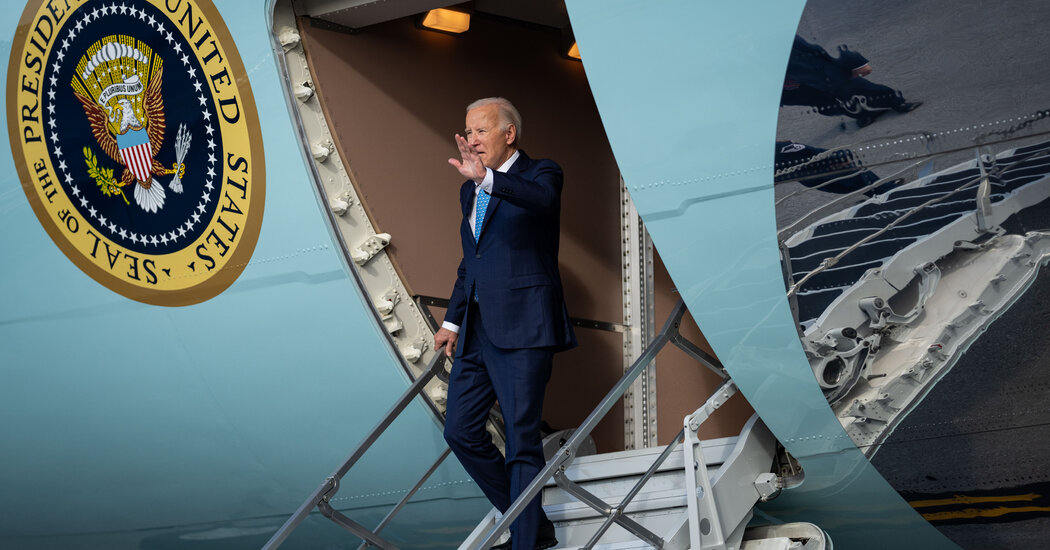
One year after a fiery train derailment spilled thousands of gallons of toxic chemicals in East Palestine, Ohio, President Biden will travel there on Friday and face a politically divided community anxious over the long-term health consequences of an environmental catastrophe.
Mr. Biden, who promised to visit soon after the disaster, has faced criticism from Republicans and some residents for not going sooner. In a sign of how politically fraught the situation has become, Trump supporters planned a rally to coincide with Mr. Biden’s visit.
“The town is still very divided,” said Misti Allison, a 35-year-old resident of East Palestine, a small town in a conservative state. She said some people hoped that Mr. Biden’s visit would bring the kind of relief many people wanted, such as health screenings far into the future.
“Some people say it’s too little, too late,” she said. “You should’ve been here February of last year, not February of this year.”
Mr. Biden is expected to give remarks on Friday detailing his administration’s effort to help residents of East Palestine, as well as outline measures to hold accountable Norfolk Southern, the operator of the freight train carrying the toxic chemicals.
The White House has said the government has sent a steady flow of federal resources to the community and deployed hundreds of people to assess the risks in the days after the spill. Some members of the community, many of whom have said they are suffering from health problems, say Mr. Biden should issue a disaster declaration, which would allow the state to tap into even more federal resources.
Norfolk Southern said it had spent more than $800 million on cleanup, legal costs and assistance to the community. Tens of thousands of tons of contaminated solid waste and millions of gallons of wastewater have been shipped out of East Palestine, the Environmental Protection Agency said. Ohio declared the drinking water safe just weeks after the crash.
“The president has no concerns with drinking the water in East Palestine,” Karine Jean-Pierre, the White House press secretary, said on Thursday during the daily briefing. “The E.P.A. is confident that the drinking water is safe.” Ms. Jean-Pierre was responding to a reporter who mentioned that President Barack Obama drank filtered water in Flint, Mich., in 2016 after a lead contamination crisis in the city.
The train was carrying more than 700,000 pounds of vinyl chloride, a carcinogen used to produce pipes, furniture and packaging, when it derailed. Emergency responders set the chemicals ablaze during a so-called controlled burn to avert a wider explosion.
Presidential visits to devastated communities usually provide the opportunity for Democrats and Republicans to ignore their clashes and focus on showing empathy. Local leaders have often commended Mr. Biden on such occasions.
But Mr. Biden, who ran for president on a pledge to unite the nation, is expected on Friday to encounter a community that is a microcosm of a politically divided nation.
Even the invitation for Mr. Biden to visit from the mayor of East Palestine, Trent Conaway, carried a hint of the division. Mr. Conaway has also criticized Mr. Biden for allowing former President Donald J. Trump to visit the community of about 5,000 before him. Mr. Trump called Mr. Biden’s appearance at such a late date “an insult.”
Mike Young, who lives about 45 minutes away from East Palestine and is organizing the pro-Trump rally, said he believed Mr. Biden’s visit was motivated by politics.
“You’re coming during an election year,” he said.
Timothea Deeter, a community organizer at River Valley Organizing, an Ohio environmental justice nonprofit, said she was “kind of glad” but also a “bit wary” that Mr. Biden was visiting.
“If he’s going to come and take a bunch of pictures and use this as a photo op, that’s not OK,” Ms. Deeter said. “That’s not getting us the aid that we need. But if he’s going to come and help us out and respond to this disaster in earnest, I want him to do that.”
The White House has said the visit is meant to transcend politics.
“You will see a president,” Ms. Jean-Pierre said, who “goes out there — whether it’s a red state, blue state, urban America, rural America — to hear and make sure that he is a president for all.”
But politics may be inescapable. Even as pro-Trump demonstrators rally on one side, others plan to hold a protest demanding that Mr. Biden bring additional aid to the community. And some residents worry that one year after a flurry of politicians turned their small town into a prop, it is about to happen again.
“We’re getting tired,” said Jami Wallace, who formed the Unity Council for the East Palestine Train Derailment to keep track of the response and the community’s concerns. “We have the same unanswered questions and same needs as a year ago, but the only difference is now we’re losing hope.”